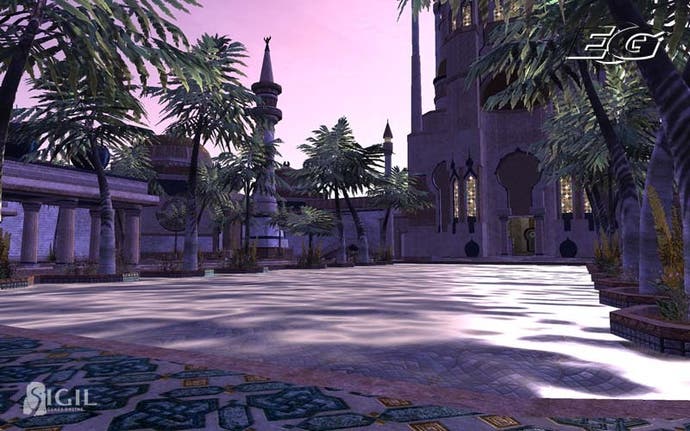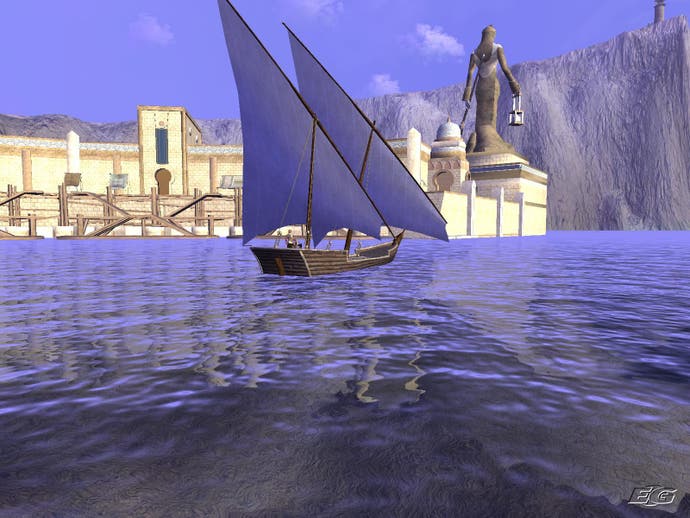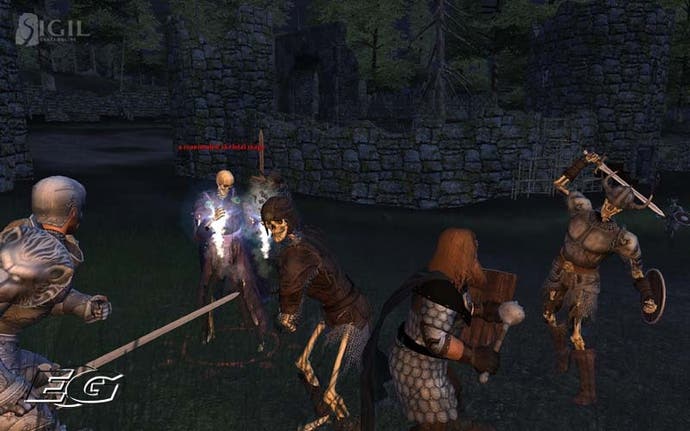Vanguard: Saga of Heroes
You are not prepared.
Changing the Guard
Unfortunately, these innovations are let down badly by some seriously retrograde steps which Vanguard takes - betraying, perhaps, a certain arrogance on the part of its creators, who were widely considered as the founding fathers of the MMOG genre thanks to their involvement with EverQuest. It may seem cheap to bring up WOW constantly when talking about other MMOGs, but we all know how successful WOW has been. And let's face it, that success isn't because WOW was in the right place at the right time, or because of the strength of the Warcraft brand. It's because Blizzard made an incredibly good game which changed the MMOG genre in ways which make it fun; but, in places, Vanguard chooses to ignore the example set by its enormous competitor in a manner which simply seems sulky and churlish.
In Vanguard, the storylines of the various races, continents and factions are spread over the world more thinly than a condom over a blue whale. The "lore" of the game (the fantasy world which you uncover) feels like an amateur Sunday effort; it's patchy, hackneyed and badly written. And while the diplomacy system makes the delivery of the whole thing vastly more interesting, there's a constant feeling that diplomacy gameplay is just filling in the cracks for a pretty awful back-story. Comparisons with WOW - or indeed with many other RPGs - are inevitable, and unkind; and while many players probably won't care, there are a great many who want the worlds they explore to be more than just a lot of pretty pixels. The lack of rich lore in Vanguard is a black mark, and feels like a throwback to the Bad Old Days.

Another black mark comes in the form of another throwback - corpse running. Vanguard is cruel to its players; death often comes at an extraordinarily hefty XP penalty, and the only way to claw back that penalty is by running to your corpse. This isn't like WoW's easy runs through the spirit realm, which penalise you without actually ever leaving you completely stuck; rather, it's a case of running through dangerous zones (which killed you last time, remember) to find your original body, all the while in danger of dying again.
Or how about a black mark for this one; enforced grouping. Vanguard takes the "multiplayer" part of "massively multiplayer" very seriously. Even relatively early on in the game, you'll find that a huge number of quests can't be completed without playing in a party. Annoyingly, the game doesn't warn you of this, leaving you to get splatted a couple of times before working out for yourself that you're going to need help.
Perhaps stemming from a similar philosophy is the decision not to include instanced dungeons (dungeons which, once your party enters them, are for you and you alone - any other party entering the same dungeon gets their own version), which means that other parties can interfere with your quests, forcing you to camp out and wait for quest monsters to respawn, and so on.
For each of these things, and plenty of others like them, there are a few vocal defenders. But, frankly, these are the tedious random battles of the MMOG genre. They're a relic of the past, or should have been. Vanguard's designers should have looked harder at the WOW phenomenon and realised why the damn game is so popular; it's because Blizzard looked at long-time MMOG traditions like these and decided they were officially Not Fun. Corpse running is Not Fun. Forcing people to stand around looking for a group rather than giving them the option of playing solo for a while when they're not in the mood or can't find a decent one is Not Fun. Standing around waiting for a quest monster to respawn because someone else just killed it is Not Bloody Fun. If anyone ever writes a rule-book for videogame design, rule numero uno should be "If It's Not Fun, Don't Put It In Your God Damned Game".
Heroes of Right and Left Click

The thing about Vanguard is that for every piece of wrong-brained badthink you uncover in the design, there's another great idea, another lovely piece of innovation, shining out at you. It's like the game is simultaneously tugging back towards a past when only 300,000 people in the world played MMOGs, and reaching towards a bright future when tens of millions will be enticed by fascinating, rewarding and addictive systems to play, and beautiful, intricate worlds to adventure in.
Take the character customisation options. These allow you to fiddle with every element of the face and body individually; or the fantastic decision to run with having four character class groups (representing the four core MMOG professions: tank, damage-dealer, healer and nuker) which encompass 15 different classes, each with a unique style of play, but each of which fits into a core role in a given party.
How about the battle system in the game? This is one area where Sigil's cup truly overfloweth with innovation and a clear determination to make something better and more exciting than any MMOG combat system which came before. There's a wonderful system which is based on reactions to what happens in combat. Certain actions taken by allies and enemies can open up new abilities of your own, such as counter-attacks or defensive moves, which may in turn lead into powerful chain attacks. These battle options flash up on screen as they're available, and utilising them makes for dynamic, hugely involving battles which are quite unlike the auto-attack combat seen in many MMOGs. It's a welcome change, and one which makes even the eternal level grind feel a lot less arduous, because you're playing a game with some actual skill and dynamism to it.

Then there's the decision to give players a mount at level 11, and upgrade it progressively to more and more impressive steeds as you progress through the game, culminating in flying warbeasts which soar over the expansive terrain of the game. There's the promise of being able to own property, build houses in the cities, open shops which have specific opening hours and make money for you while you're not even logged in, not to mention being able to build and sail boats, and, if you're in a guild, enormous ships of war. The basics of these systems are there for you to walk around and gawp at from the outset. Few games offer quite so much incentive to get to the high levels and really start playing around with astonishingly cool stuff.
Speaking of things to gawp at, the graphics of the game largely fall into this category, with Vanguard standing head and shoulders above most other titles in the genre in terms of what it tries to accomplish with its graphics engine. At its best, it's a truly stunning looking game, with beautiful atmospheric effects, incredibly long draw distances and hugely impressive environments and architecture. The world's flora and fauna is also gloriously rendered, and the game does an excellent job in the early stages of putting more and more striking vistas in front of players, to entice them to explore ever further into the world of Telon.
Now, if this were a conventional review of a standalone game, this would pretty much end the commentary. We'd now sum up the good points and the bad, and award a score. However, this is not a standalone game. and as such, there's something else to consider. This, as previously mentioned, is a snapshot of Vanguard as it stands right now; and right now, there are other aspects to the game which are not pretty in the slightest, and which warrant discussion in any review.









